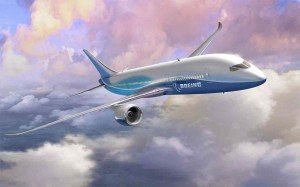The ongoing investigation of faulty lithium-ion power packs on the new 787 Dreamliner could have implications far beyond the aerospace industry, some observers worrying that Boeing’s battery problems could short-circuit the nascent market for plug-ins, hybrids and other electrified automobiles.
Investigators in the U.S. and Japan have put a spotlight on the lithium backup power systems used on the new Boeing jet, linking the technology to several recent incidents, including a fire on one of the Dreamliners parked at a gate at Boston’s Logan field. Some observers are pointing to a series of fires involving the battery packs used in various electric vehicles, including the Chevrolet Volt and Fisker Karma.
With the Boeing story getting a lot of airplay, “This is definitely an issue,” said Joe Phillippi, of AutoTrends Consulting. “This could be particularly bad timing,” the analyst cautioned, considering the push to increase sales of battery-based vehicles in the years ahead.
All 50 of the new jets Boeing had so far delivered have been grounded and investigators yesterday visited GS Yuasa, the Japanese manufacturer of the lithium batteries on the 787. While some aircraft have used the technology before, Boeing’s is the most advanced and extensive. One of two batteries involved in recent Dreamliner incidents shows signs of having been overcharged though the other did not, according to investigators.
“We are in the midst of collecting information, so as to whether there is a problem or not has not yet been determined,” said Tatsuyuki Shimazu, the chief air worthiness engineer at Japan’s Civil Aviation Bureau’s Aviation Safety Department.
Several investigations were conducted into fires involving lithium-ion batteries involved in automotive applications. That includes a fire that destroyed a Fisker Karma plug-in hybrid parked in a Texas garage last year, and another involving Fiskers that were caught in flood waters during Superstorm Sandy last autumn. Several other battery based vehicles, including a Toyota Prius, also caught fire in a storage lot at a port outside Newark, New Jersey and it appears salt water short-circuited their electrical systems.
The Chevrolet Volt plug-in hybrid also became a target of investigators in 2011 when the National Highway Traffic Safety Administration revealed a battery pack caught fire weeks after a Volt was crash tested. A second battery later started smoking after it was tested.
Eventually, investigators concluded the Volt problem was largely the result of NHTSA’s testing procedures. Nonetheless, General Motors subsequently made significant changes to further reduce the likelihood of problems following a crash.
Separately, Fisker announced changes to its battery system design following a fire linked to a cooling fan system. And the California-based start-up was forced to order a recall of early versions of the Karma when a manufacturing defect was discovered by battery supplier A123.
Fisker has struggled with sales significantly lagging initial expectations. Chevy, meanwhile, suffered a short-term decline in sales after the initial report of the fire at a NHTSA test center. Demand soon rebounded, however. Sales of the plug-in more than tripled last year compared to 2011 levels – but still came to barely half of GM’s initial 45,000 target for the U.S. market.
“No questions, these kinds of headlines (surrounding the Boeing batteries) are not going to help battery vehicle sales,” contends analyst Phillippi and others.
Even without such concerns, the auto industry has struggled to boost demand for the high-mileage technology. Nissan, which also has struggled to meet expectations for its Leaf battery-electric vehicle, or BEV, last week announced it would introduce a new version that comes in $6,000 below the price tag of the 2012 model. With various state and federal incentives, the maker announced, some buyers could purchase the Leaf for less than $20,000.
(For more on Nissan’s plans for the Leaf, Click Here.”
As for the Volt, which is currently the best-selling “advanced propulsion” vehicle on the U.S. market, company officials insist they’re pleased with the way sales are trending. Countering skeptics, Mark Reuss, GM’s president of North American operations, told reporters “The electric car is not dead.”
(Click Here for that story.)
He’s not the only one hoping that’s the case. A variety of manufacturers have begun rolling out new electrified products, from conventional hybrids to full battery-electric offerings. That includes the new Ford Fusion Energi, the Toyota RAV4-EV and a plug-in version of the Honda Accord.
Those two Japanese makers have previously preferred to use less advanced nickel-metal hydride batteries, officials expressing concerns about potential problems with lithium technology. The Boeing issue underscores such concerns, though battery technology proponents hope the issue will soon be resolved.


Lithium-ion batteries have been fire hazards for years. They need to sort out the issues and be 100% certain they can’t occur in the future. You can stop and exit a car on fire, but not an airplane. They should be able to resolve this issue IMO.
I’m surprised by the battery problem, Jorge. Of all places to not get this technology down before putting it in commercial use…
Paul E.